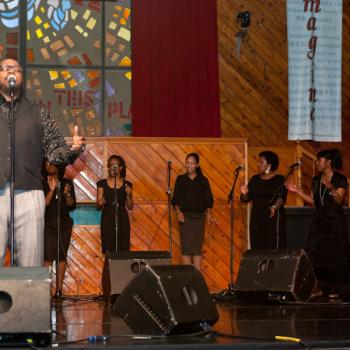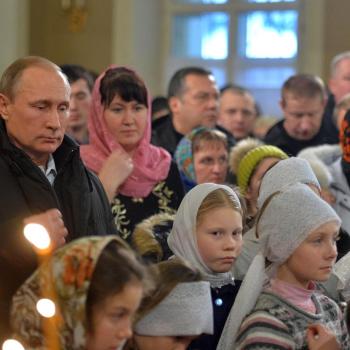
The issues are complex, and the future of the United Methodist Church is far from certain. Yet, Bishop Tracy S. Malone peppers her conversation with words such as hope, unity, inclusiveness and God as she settles into her two-year term as president of the United Methodist Church’s (UMC) Council of Bishops.
Malone’s election to the church’s highest office is historic. She became the first black woman ever elected to lead the United Methodist Church in November 2023. She accepted the gavel from outgoing president Thomas J. Bickerton during the General Conference, which ended May 3.
Her two-year term comes at a time when the United Methodist Church is regrouping and healing after a massive split that rocked the denomination.
And she has other challenges. The General Conference approved a plan to restructure the church, and UMC’s annual conferences will begin voting on it within days. Their final approval is required to enact the plan. If approved, it would create four large regions worldwide: the U.S., Africa, Europe and the Philippines.
“The goal is to empower each region to act more nimbly in reaching people for Christ — without waiting for General Conference, which typically meets every four years,” the church said in a statement. The General Conference is the church’s largest legislative body.
Surviving the Split
UMC’s split has been called the greatest religious divide in American history by some and the nation’s largest religious split since the Civil War by others. More than 7,600 churches left the church between 2019 and 2023 over disputes about gay clergy, same-sex marriage and other social issues related to human sexuality. Some of the departing churches joined the new conservative Global Methodist Church while others became nondenominational.
For background information about the situation, you may want to read “God, Country, And the Great UMC Fracture” by Patheos contributor C. Don Jones or Jacob Randolph’s post, “United Methodist General Conference: What to Look For,” also on Patheos. One of my most recent articles, which appears on Beliefnet, concerns legislation passed at the 2024 General Conference, held April 23-May 3.
A Critical Time
The new COB president assumes the leadership role at a critical in UMC’s history. Delegates to the 2024 General Conference, which ended last week, revolutionized the church’s stance on LGBTQ+ issues by amending the Book of Discipline in major ways.
While those issues were and are extremely divisive, Malone says the legislation approved by the General Conference “allows us to be inclusive of all people.” She explained that it “frees up the church to live our unity…. We have removed the harmful language that has guided the church since 1972.”
Perhaps she’s right.
A New Beginning
Conservative and progressive United Methodists had reached a point of no return in recent years. No one could or would change their minds about LGBTQ+ issues, and further arguing seemed pointless. So, the church came apart, and this year’s General Conference voted to:
- Remove language that said, “The practice of homosexuality… is incompatible with Christian teaching”
- End the ban on ordaining and appointing “self-avowed practicing homosexual” clergy
- Delete language that prohibited UMC clergy from performing same-sex weddings and remove mandatory penalties for clergy who did so
- End the prohibition against funding support groups, activities and causes that promote gay acceptance
Hope, Unity & Inclusiveness
“The United Methodist Church is a worldwide, beautifully diverse church, and we believe in unity,” Malone emphasizes. “We celebrate our diversity, and we embrace our cultural and theological differences.”
She points out that the UMC’s unity in Christ and its connection as a church transcends borders, geography, barriers and differences.
“There is a renewed hope and a renewed focus in the life of our church as we continue to expand our witness for Jesus Christ and live our mission of making disciples…. We welcome the stranger, engage in ministry with the poor, care for those who are marginalized, work for peace and justice….” she explained.
Preparing to Lead
Malone acknowledges that she will lead the church during “challenging” times, but she may be the right person at the right time for the job. It certainly seems as if she has spent her entire life preparing for the highest leadership role in one of the world’s largest Christian denominations.
Her introduction to the Christian faith came early because her father was a pastor and both parents were devout Christians. She answered God’s call to the ministry at age 13 and served as a teenage preacher for a time. She also attended the Maceo D. Pembroke Institute, a ministry of Black Methodists for Church Renewal at Garrett Theological Seminary in Evanston IL, according to UMC.
Malone earned a bachelor of arts degree in religious studies and sociology from North Central College in Napierville, IL; a master of divinity degree from Garett-Evangelical Theological Seminary; and a doctor of ministry from United Theological Seminary in Dayton, OH.
She has pastored several churches in the Northern Illinois Conference, served as district superintendent and was dean of the cabinet before becoming the first female bishop of the East Ohio Annual Conference, UMC says. She also is an author and has taught courses as an adjunct professor at Aurora University and Northern Baptist Seminary in Lombard, IL.
A Determined Woman
Tracy Malone’s strength and determination have been evident in her past work, and they will be needed as she tackles the difficult challenges ahead. Several years ago, Malone learned that female students at Africa University in Zimbabwe desperately needed on-campus housing. As a member of the school’s board of directors, she became determined to build a residence hall.
Malone shared her dream with people in UMC’s East Ohio Annual Conference, and they responded. In a short time, they raised $1.5 million, and despite COVID, saw the residence hall become a reality within two years. It was dedicated in February 2024 and named in Malone’s honor.
Looking Ahead
And now — as UMC begins to heal from the disaffiliation crisis — the focus may turn to another major issue: the regionalization plan approved by UMC’s 2024 General Conference.
The plan will create four regions – the U.S., Africa, Europe and the Philippines – in the worldwide church. However, it still requires approval by two-thirds of the church’s annual conferences. Voting begins in the next few weeks and the decision is expected next year.
“Regionalization recognizes and respects the contextual missional realities, needs and opportunities across the United Methodist Church,” according to Malone. “It’s a form of connectionalism that maximizes the gifts and resources of the whole church, enabling the diversity to emerge….”
Malone noted that UMC is expanding its worldwide reach, as well as its “witness, mission and reach. We are becoming a more inclusive church, and we need to celebrate our unity….”
“The United Methodist Church is still one connectional church,” Malone noted. “Connectional” in the UMC context means that all church leaders and congregations are connected in “network of loyalties and commitment.” Churches and other UMC organizations work together, support one another and share resources in their missions and ministries….
“We are one church in many places,” she says.
Malone seems filled with energy and optimism as she tackles the challenges of leading one of the world’s largest denominations.
The idea may seem daunting to some people, but she says, “I’m hope-full, encouraged… and excitedly expectant…. Fresh winds of God’s spirit are moving across the church and creating missional pathways for the… United Methodist Church.”
A Church Reborn, Reconciled & Committed
On the final day of UMC’s 2024 General Conference, Malone told the delegates and visitors that the work the conference did this year “was not as important as what work the church will do next.”
She recalled King David’s “bold proclamation that God is our refuge and our strength.” And she asked delegates to imagine a church that is reborn, reconciled and committed to building “God’s beloved community.”
Malone pointed out that David focused on the goodness, providence, guidance and protection of God, rather than on his own problems and crises.
She also said that whether laity and clergy realize it, people around the world continue to experience the effects of “the racial, political and cultural violence that is pervasive all around us…. And if we are honest…. there is still some anxiety of how we will fully live into the decision and commitments that we have made here….
“God is. Period. Fact. God is,” she said. “God is our shelter in the midst of the storm. God is our help, right here and right now. And always, God is with us. God is with this United Methodist Church leading us, and guiding us, and sustaining us, and preparing for us a future with hope.”
Malone has gone from preaching the gospel as a teenager to leading the worldwide United Methodist Church. It isn’t a stretch to say that God has been preparing her for her new role for many years. The United Methodist Church believes He has — and I would have to agree.

















